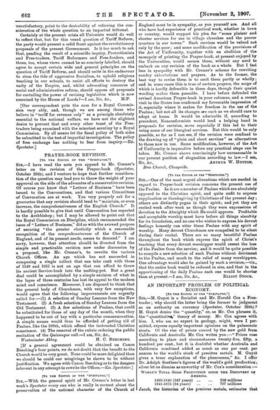[TO TRI EDITOR Or THE "SPECTATOR."]
Si,—With the general spirit of Mr. Cremer's letter in last week's Spectator every one who is really in earnest about the preservation of the national character of the Church of England must be in sympathy, as you yourself are. An4 all who have had experience of practical work, whether in town or 'country, would support his plea for "some plainer and shorter services for use in village churches and the poorer quarters in our towns." Such services would be valued not only by the poor ; and some modification of the provisions of the Act of Uniformity, together with an abolition of the monopoly of printing the Prayer-book, at present enjoyed by the Universities, would secure these, without any need to embark on any revision of the book as a whole. But I feel less in sympathy with Mr. Cremer's scheme for rewriting sundry exhortations and prayers. As to the former, the best way to revise them is to omit them partly or wholly ; and in some cases this is true of certain prayers, the scope of which is hardly defensible in these days, though their quaint wording makes them passable. I have before defended the revised American Prayer-book in your columns, and a recent visit to the States has confirmed my favourable impression of it, especially where it makes for freedom in the use of the Psalms ; hut not all its changes are such as we should care to adopt at home. It would be admirable if, according to precedent, Nonconformists would lend a helping hand in proposals for revision, more especially if this led to their using some of our liturgical services. But this would be only possible, so far as I can see, if the revision were confined to the drawing up of "plain and short services" as alternatives to those now in use. Some modification, however, of the Act of Uniformity is imperative before any practical steps can be taken. Mr. Cramer shows convincingly how unreasonable is our present position of stagnation according to law.—I am,






























































 Previous page
Previous page